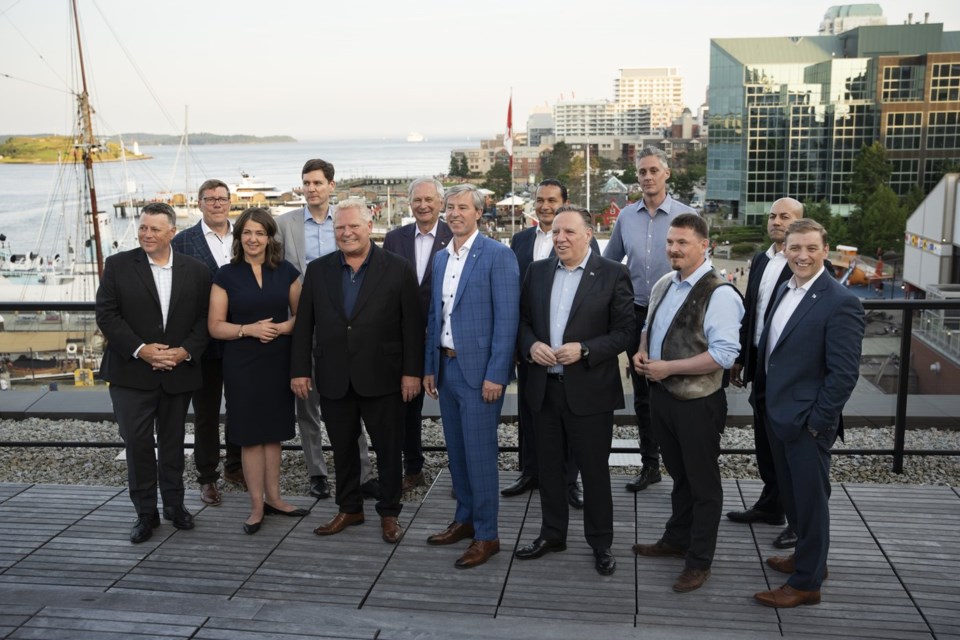HALIFAX — A three-day meeting among Canada's premiers ended with provincial and territorial leaders calling on Ottawa to quickly ramp up defence spending in order to protect the country's trade relationship with the United States ahead of its upcoming election.
At the closing news conference of the Council of the Federation meetings in Halifax, multiple premiers highlighted the importance of Canada's NATO commitment to spend at least two per cent of GDP on defence.
"It’s really important we meet those obligations on the world stage," Nova Scotia Premier Tim Houston said Wednesday.
"For Canada and its relationship with the United States — we are significant trading partners, we want them to respect us fully, in all aspects, including our ability to honour obligations.”
Last week, Prime Minister Justin Trudeau said he expects to hit NATO's defence spending target in 2032 — a newly announced timeline that came after days of pressure from other countries.
Conservative Leader Pierre Poilievre has said he would not commit to the alliance's spending goal. He said last week that's because he doesn't make promises he cannot keep.
On Wednesday, Manitoba Premier Wab Kinew called on Ottawa to meet the target before 2032 in order to protect Arctic sovereignty and the country's relationship with the United States.
Kinew said many jobs in Manitoba are linked to trade with the U.S. and being a good NATO partner is essential for the relationship between the two countries to "flourish."
"It’s an investment in our military and defence, but this is also an economic investment," he said during Wednesday's closing press conference.
"And if we don't make this investment, the next U.S. administration is likely to cause ... some consternation when it comes to the super important relationship with U.S. trade to create jobs and economic opportunities across Canada."
British Columbia Premier David Eby said due to Canada's current military funding plans, there's a sense of "anxiety" about a potential Donald Trump administration.
"Having a tight relationship with the United States is really important. And I think it's unambiguous, the message from a potentially incoming Republican administration, around what their expectations are from Canada in terms of investments in defence," Eby said Wednesday.
"So we really encourage the federal government to be prepared for that, to be prepared for an incoming Republican administration, so that we're taking that off the table as one of the possible areas of dispute."
Newfoundland and Labrador Premier Andrew Furey also said Wednesday he agreed that Ottawa should work towards meeting the NATO target before 2032, and urged the federal government to start by putting money into 5 Wing Goose Bay, the existing military base in the far north of the province.
Furey said another important defence priority should be protecting the region's cod — an important regional industry that had been under a federal moratorium for more than 30 years.
The premier said the province is celebrating the return of the valuable fishery, but in lifting the moratorium the federal government has "invited Russian trawlers off our shores."
"This is a resource that has been nursed back to good health by the people of Newfoundland and Labrador and it does not deserve to be caught by Russian trawlers," Furey said.
On Tuesday, premiers Ranj Pillai of the Yukon, R.J. Simpson of the Northwest Territories and P.J. Akeeagok of Nunavut held a press conference on Arctic security and the importance of collaborative investment in building up infrastructure to protect Canada's Arctic, which is targeted by Russia and China and coveted for its abundant resources.
Throughout the three-day conference, premiers repeated calls for the federal government to back off from areas of provincial and territorial jurisdiction, and work more collaboratively to avoid doubling up on programs like dental care or school lunches.
“What we’ve asked for from Ottawa is to partner with us on those things and work with us, and not try to go around us — as may be the case sometimes, as we see on some of the housing stuff that’s happening now," Houston said Tuesday. A federal program that gets heat from provinces is Ottawa's Housing Accelerator Fund, which distributes money for housing directly to cities and municipalities, bypassing provincial governments.
In a letter from Trudeau to Houston and Ontario Premier Doug Ford on Wednesday, the prime minister said his government’s intent is to use federal funding to improve the lives of Canadians, “not to infringe on provincial and territorial jurisdiction.”
This letter comes after Eby said Tuesday working with Ottawa can feel like “beating our head against a wall."
Eby told reporters that for years at these federation get-togethers, he and his counterparts have asked for a meeting with Trudeau.
"That call continues to go unanswered and I cannot understand why because we have a lot of work to do together," Eby said.
This report by The Canadian Press was first published July 17, 2024.
Lyndsay Armstrong, The Canadian Press



